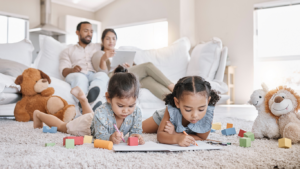In the wake of the COVID-19 pandemic, many parents made the decision to homeschool their children. To this day, the pandemic-caused surge in homeschooling continues, despite schools being reopened and lockdowns being lifted. But what are the best ways to socialize your homeschooled children?
Health concerns, disagreement with school policies, and a desire to keep their children learning in a way that works best for them are the main reasons parents have continued to direct their children’s education.
READ ALSO: 5 things you didn’t know about micro schools
Now more than ever, it is crucial that homeschooled children develop social-emotional skills after the past two years of mask-wearing and stay-at-home orders. Social-emotional skills can have a life-long impact on children’s ability to build friendships and connections, build confidence, learn their strengths and weaknesses, resolve conflicts, and manage stress and anxiety.
Social connections and relationships are the foundation of every classroom. When children become homeschooled, they cannot naturally build social techniques. While your curriculum may focus on social-emotional learning, your child must have opportunities to socialize with other children daily, especially if your child does not have any siblings.
While it may be more difficult for homeschooled children to form social skills, many resources and groups will help your children develop the social skills they need to be successful in life.

Extracurricular Activities: Signing your child up for sports teams or group art classes can be a great and simple way to socialize. Extracurriculars allow children to pursue the activities they love, try new things, and engage in physical and mental exercise. Best of all, it provides fun opportunities for kids to interact with others.
Support Groups: With the pandemic-caused surge in homeschooling, there are likely other home-schooled children in your area and the local community. Fortunately, Arizona has a large homeschool community that provides group classes for home learners. Take advantage of your local homeschool community by joining a support group, hosting, or participating in get-togethers with other children, and signing up for classes specifically for at-home students. Group classes allow students to participate in school-related work, such as team projects.
Kid-friendly Places: Now that many places have opened back up again after the pandemic, several kid-friendly places across the state are perfect for socialization, such as local parks and arcades. Setting up scheduled meetups with other children at your local park can help your child learn critical skills in a fun environment, such as building connections. Depending on your religion, you can even sign your child up to join the youth group at your church.
Home Learning: While engaging with other children can be an excellent way for your homeschooled child to socialize, you and your family can help demonstrate different social cues that your child will likely pick up on. Develop meaningful relationships with others, creating an organized routine in your household, staying active within your neighborhood, and partaking in fun, family activities are just a few of many ways your household can demonstrate good social skills. Even allowing time for fun ‘field trips,’ to local places allows children to explore new sites and experience cultural learning in a new way. How parents act and behave can have a significant influence on children’s emotional and social behavior and understanding.
Deciding to homeschool your child can be a big responsibility. Fortunately, there are several curriculum programs across the state of Arizona that allow parents to choose the program that fits best for their needs and their children’s needs. Many of these programs will provide support resources and tips for parents, including local opportunities for child socialization.
There may come a time when your child feels ready to rejoin the classroom, or homeschooling is no longer an option depending on circumstances. This change can be a big adjustment for children who spend a long time away from a classroom. Signing your child up for group classes can help them better ease into this transition and allow them to become more familiar with a classroom-type setting. Make sure your children know that you are still available for emotional and academic support and talk to them about any concerns they may have about going back.
With the continuation of the homeschool surge, parents need to prioritize learning and developing critical social and emotional skills. After the past two years, when children were forced to adjust to at-home learning and distanced from their friends, many lost out on crucial socialization opportunities. Making social-emotional learning and skill development a priority is key to helping homeschooled children get that socialization back. Extracurricular activities, joining your local homeschool community, visiting kid-friendly places, and encouraging positive social skills at home are just a few of the many ways children can work to form important life skills.
Author: Ben Smith is the CEO and creator of Gnosis IQ, an artificial intelligence software that predicts students’ future performance and tracks students’ emotional status throughout the day. The platform also provides students, parents, teachers, and administrators the ability to intervene and help academically struggling students before it becomes a significant problem. Smith designed Gnosis IQ during the pandemic as he saw the impact remote learning and social distancing had on students’ emotional and academic performance. For more information on Gnosis IQ, visit https://www.gnosis-iq.com/.




